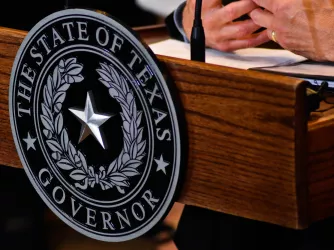Table of Contents
Universities Must Not Intrude Upon Freedom of Conscience in 'Values' Statements

This winter, FIRE is running a series of blog posts about what makes a “green light” policy. So far, we have examined how universities can craft policies on harassment, civility, and computer usage that achieve their aims while still respecting students’ right to freedom of speech. Today we are going to talk about policies that infringe on students’ right to freedom of conscience, and about how universities can share their values with students without crossing the line into mandating agreement with those values.
Just as the First Amendment protects freedom of speech, it also protects freedom of conscience—the right to keep our innermost thoughts free from governmental intrusion and to be free from compelled speech. As the Supreme Court declared in the landmark case of West Virginia State Board of Education v. Barnette, 319 U.S. 624, 642 (1943): “If there is any fixed star in our constitutional constellation, it is that no official, high or petty, can prescribe what shall be orthodox in politics, nationalism, religion, or other matters of opinion or force citizens to confess by word or act their faith therein.” The Court concluded inBarnette that “the purpose of the First Amendment to our Constitution” was precisely to protect “the sphere of intellect and spirit” from “all official control.”
It is common for universities to announce a set of values that they hope students will share. These values typically include things like an appreciation of diversity, an understanding of the need for civility, and so forth, and are frequently laid out in documents with names like “University Creed” or “Principles of Community.” Too often, however, the language of these documents makes it sound as if students arerequired to share the university’s values as a condition of enrollment.
For example, the “Principles of Community” at the University of California, San Diego (UCSD) begin with the statement that “UCSD faculty, staff, and students are expected to practice these basic principles as individuals and in groups” (emphasis added). UCSD’s Principles of Community (PDF) also include the statements, “We acknowledge that our society carries historical and divisive biases based on race, ethnicity, gender, age, disability, sexual orientation, religion, and political beliefs,” as well as, “We value the cultural diversity of UCSD because it enriches our lives and the university. We celebrate this diversity and support respect for all cultures, by both individuals and the university as a whole.”
Similarly, the University of Pittsburgh’s “Pitt Promise” (PDF) leads off with the following: “By choosing to join this community, I accept the obligation to live by these common values and commit myself to the following principles” (emphasis added). The common values include: “I will embrace the concept of a civil community” and “I will support a culture of diversity.”
To be clear, a university has every right to share its values with students and to encourage students to adopt them and act accordingly. But when these values statements are phrased using the language ofexpectation and obligation—suggesting that students might actually face punishment for failing to adopt the university’s officially sanctioned value system—they infringe upon students’ right to freedom of conscience.
So how can a university encourage students to share certain values without requiring or coercing them to do so? The key is to include language making clear that the policy is aspirational and that students will not face disciplinary action for believing differently. A perfect example of such language can be found in Pennsylvania State University’s “Penn State Principles,” which earn a green light rating from FIRE. (The potential for abuse inherent in the UCSD and University of Pittsburgh policies, on the other hand, earn both policies yellow light ratings.) The Penn State Principles are a statement of university values very similar to the examples cited above from UCSD and the University of Pittsburgh. The crucial difference, however, lies in the Penn State Principles’ introductory language:
The Penn State Principles were developed to embody the values that we hope our students, faculty, staff, administration, and alumni possess. At the same time, the University is strongly committed to freedom of expression. Consequently, these Principles do not constitute University policy and are not intended to interfere in any way with an individual’s academic or personal freedoms. We hope, however, that individuals will voluntarily endorse these common principles, thereby contributing to the traditions and scholarly heritage left by those who preceded them, and will thus leave Penn State a better place for those who follow. (Emphases added).
By using the language of voluntary endorsement rather than obligation, the Penn State Principles convey the university’s values to students in a way that does not infringe upon students’ right to keep their own values and beliefs, free from government interference.
We strongly encourage any university that values students’ expressive rights to adopt similar language. And as a reminder, public universities are legally obligated to respect those rights. As always, FIRE would be happy to hear from students or administrators who want to learn more about reforming their university’s policies and earning a green light rating.
We will have additional examples of green light policies coming up soon on The Torch. Stay tuned!
Image: Price Center at the University of California, San Diego - Wikimedia Commons
Recent Articles
FIRE’s award-winning Newsdesk covers the free speech news you need to stay informed.

Gov. Greg Abbott’s order ‘hardening state government’ against China is dangerously hard to parse

Right, left, and in-between: Can we bring our differences to the table?

From the UK to Germany to Singapore: Police are watching what you post
